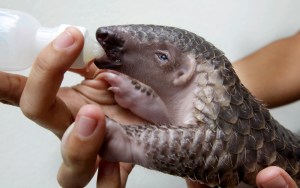Pity the pangolin. The nearly blind anteater, with only its keen sense of smell and razor-sharp plates of armor to rely on, doesn’t look like it has much of chance at making it in our modern world, and illegal wildlife smugglers seem to be doing their best to seal that fate.
Last week, customs officials in Guangzhou, southern China, seized nearly eight tons, or over 17,000 pounds, of frozen, descaled pangolin and another 4000 pounds of pangolin scales from a fishing vessel off Gaolan island. All international trade of Asian pangolin is banned under the Convention on International Trade in Endangered Species of Wild Fauna and Flora (CITES), as two of the four Asian species are endangered.
Why? Pangolin is a popular meat wherever it’s found, but in east and southeast Asia, the animal has the additional Darwinic challenge of being considered to wield medicinal powers. Its scales, made of keratin, are believed to help conditions from rheumatism and skin disease to poor lactation in new moms. They’ve been used for thousands of years in Chinese medicine without much problem, but as wealth and population has spiked in China, so has pangolin demand, and their numbers in Laos, Cambodia and Vietnam have plummeted. It’s currently the most heavily traded mammal in Asia’s illegal wildlife trade.
The crew of the vessel carrying the seized pangolin shipment, according to wildlife trade monitor TRAFFIC, was en route to transferring their illegal load to another ship when they were intercepted by authorities. The Malaysian and Chinese crew said they had been hired in China to pick up the shipment in southeast Asia.
The pangolin is just one animal in a much larger problem of wildlife smuggling taking place across Asia and the world. Billions of dollars worth of business in the illicit trade of plants and animals is done every year, and the U.S. is the biggest customer after China. By some estimates, illegal wildlife trade is responsible for the extinction of 30,000 species a year. That’s three species an hour. Tigers, bears, elephants and tortoises are all experiencing sharp declines across southeast Asia due to their high value on the black market.
In better news, the tiger got a break this week when the 13 countries that are home to tigers met in Bali about the upcoming “Tiger Summit” to be held later this year in St. Petersburg. The tiger, like the pangolin, has been struggling to cope with being poached and living in a shrinking habitat. There only about 3200 wild tigers left around the world. Tiger skins are estimated to go for anywhere from $1300-$20,000 a pop on the illegal market. Tiger bones go for $3000-$7000.



